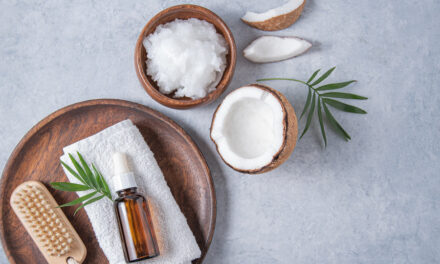
Hair is our crowning glory, so it’s understandable we do everything to ensure it’s healthy, lustrous, and long. Hair loss is a very common problem these days.
There are many reasons for reduced hair growth, hair thinning, hair breakage, and hair fall. Applying hair oil regularly can help with all these issues and more.
If you experience hair loss and want to increase hair growth, try these DIY hair oil for hair growth recipes.
Best Homemade Hair Oil Concoctions for Hair Growth and Thickness
There are many different herbal hair oil recipes for hair growth, but we’re going to see a few that are easy to prepare and less time-consuming. These DIY hair oils can stimulate hair growth, strengthen hair follicles, improve hair and scalp health, strengthen hair shafts, stimulate blood flow to the scalp, promote new hair growth, etc.
You can choose a DIY hair growth oil recipe that’s more suited to your requirements and hair and scalp type. Oils contain essential fatty acids that nourish and nurture your hair and scalp from within.
You can use these oils as a leave-in oil treatment to restore the health of your hair roots or use it as a pre-shower massage oil mixture. Let’s take a look at the recipes, shall we?
DIY Hair Growth Oil with Onion

Onions are the rage these days, with many brands joining in the crusade and include onion as one of the key ingredients in their hair growth and regrowth products. It’s best to use small onions or shallots for this recipe, though large onions would do in a pinch.
Ingredients
- Coconut Oil – 3 Oz
- Onions – a Handful
- Black Seeds – 2 Tbsp.
Instructions
- Grind onions to a paste in your mixer and set aside.
- Mash the black seeds and set aside.
- In a thick-bottomed vessel, heat the coconut oil.
- When hot, add the ground onion paste.
- Let it simmer till the moisture is fully removed, and switch off the flame.
- Wait for a few minutes and add in the crushed black seeds. The oil should slightly sizzle when you add the crushed seeds but not be hot enough that it gets burned.
- Let the oil cool down before filtering it and transferring it to a sterilized bottle.
How to Use It?
This DIY hair oil is used as a pre-shower to let it work its magic after a massage with a liberal amount of this oil. It is best when this is applied and left for an hour or even overnight before washing off with a mild shampoo. Use it at least once a week for best results.
DIY Hair Growth Oil with Rosemary Essential Oil

There are many options, though rosemary essential oil is the most popular and widely used essential oil for stimulating hair growth. A carrier oil is used as the base when an essential oil is called for in a recipe.
Ingredients
- Sweet Almond Oil – 1 Oz
- Rosemary Essential Oil – 16 Drops
- Peppermint Essential Oil – 3 Drops
Instructions
- In a dark amber glass bottle, add all the ingredients and swirl gently.
- Done! Let it sit for two days before you start using it.
Notes
You can also add other essential oils or carrier oils for improving hair health and scalp health.
You can use any carrier oil instead of almond oil, including coconut oil, jojoba oil, avocado oil, argan oil, apricot oil, olive oil, etc. Choose the base oil according to your requirements and preferences.
Onion is used to curb hair fall or hair loss and can be incorporated in this recipe by infusing the base oil.
Rosemary oil helps with promoting hair growth and is often a staple in oils for hair growth. It’s used in many products as it stimulates hair growth, along with other benefits, including delaying premature graying.
Infused herbal oils for hair growth are an option instead of plain carrier oils. You can infuse your favorite carrier oils or add essential oils for hair care.
Also, if you have fine hair, consider using argan oil as your base, or along with sweet almond oil as it’s light and doesn’t weigh down your hair – especially important if you’re using this as a leave-in.
How to Use
This is a light oil blend and can be used as a leave-in. A little goes a long way, so you only need a few drops.
Massage this oil onto your scalp in gentle circular motions, covering your hair strands as you go along. Don’t forget the tips.
You can style it as usual.
However, if you want to use this as a pre-shower treatment, you can also add castor oil to this recipe. You can add a spoon or more.
DIY Hair Growth Oil for Healthier Hair

This is homemade hair oil, but it is still easy and takes less time to prepare. We’ll use hibiscus flowers and essential oils in this recipe.
Ingredients
- Coconut Oil – 100 Ml
- Hibiscus Flowers – a Handful
- Thyme Essential Oil – 7 Drops
- Cedarwood Essential Oil – 7 Drops
Instructions
- In a thick bottom pan, heat the coconut oil.
- When it is hot, add the hibiscus flowers and wait till the oil color changes – the petals are fairly colorless.
- Remove from heat and filter to an amber glass jar when it is slightly cooler.
- Once the infused oil cools down, add the essential oils and shake gently. Done!
Notes
You can also use this as a pre-shower treatment. In that case, wait for at least an hour before washing off.
You can also use castor oil if you’re considering using this as a pre-shower oil treatment. You can use coconut oil along with it, as it is thick, and adding coconut oil makes it easy to apply.
Thyme essential oil promotes hair growth by stimulating blood circulation to the scalp. You can choose essential oils for hair growth promotion if you don’t prefer Thyme.
Hibiscus has been used for centuries to promote hair growth. If you don’t get fresh flowers, you can use dried petals.
You can also add chunks of small onion to this natural hair growth oil for faster hair growth and regrowth.
Cedarwood essential oil also promotes hair growth.
You can use other herbs, essential oils, or infused oils like peppermint oil, rosemary oil, or even false daisy oil in this recipe to improve hair growth.
How to Use
Gently massage the oil onto your scalp, and don’t forget to coat your stands with this oil sparingly.
Style, as usual.
DIY Hair Growth Oil with the Goodness of Castor Oil

This is a very simple pre-shower treatment that will curb hair fall, increase hair growth, strengthen hair follicles and cuticles, strengthen hair shaft, soothe and nourish dry hair, deal with scalp issues like dandruff, and more.
Ingredients
- Castor Oil – 1 Oz
- Camphor – a few pieces
- Olive Oil – 1 Oz
- Lavender Essential Oil – 25 Drops
Instructions
- In a dark amber glass bottle, add all the ingredients given in the list.
- Shake gently and let it sit for two days before use.
Notes
You can use any carrier oils of your choice instead of olive oil in this recipe. Coconut oil, almond oil, argan oil, infused herbal oils like rosemary oil, lavender oil, and peppermint oil can be used.
You can also choose essential oils for hair or scalp care or swap ingredients you are allergic to or don’t suit your requirements.
Castor oil is a great ingredient when you want to prepare oil for hair growth, but it is a highly viscous oil and can weigh down your hair, especially if you have fine hair. So you could alter the ratio and use it, though as a pre-shower treatment, it shouldn’t be an issue.
Best essential oils for hair care include rosemary oil, basil oil, eucalyptus oil, lavender oil, tea tree oil, bergamot oil, clary sage oil, citrus oils, ylang-ylang oil, and more for faster hair growth.
How to Use
Slightly warm the DIY hair oil just before use.
Gently massage the oil onto your scalp and work your way to the tips.
Make sure you coat all your hair strands, too.
Wrap a warm towel around your head and wait for at least 25 minutes before washing off with a mild shampoo.
Benefits of Homemade Hair Growth Oil
DIY hair oil for hair growth recipes given above not only promote hair growth but also curb hair fall, improve blood circulation to the scalp, stimulate hair growth, nurture and nourish hair and scalp, etc.
Healthy hair and scalp are a result of continued and consistent care, which includes using oil regularly. Only nourishing and nurturing ingredients are chosen and picked according to your requirements: promote hair growth, reduce hair loss, curb hair thinning, curb scalp issues like dandruff, dryness, itching, etc.
When using homemade oil, you can modify the recipe to suit your requirements better. You know what goes in, and there are no harmful chemicals or ingredients.
Feel free to write back to us with your questions, requests, and feedback. Don’t have time for DIY Recipes? Don’t worry, and we have you covered with a range of premium products from Vitamins Revive. Do you have a need? They have a solution. Do check out the Vitamins Revive Store to learn more about our products.
FAQs
What are essential oils?
Essential oils are highly beneficial plant extracts, usually concentrated and widely used for the many benefits they have to offer. However, since they’re really concentrated, volatile, and potent, they should be diluted with a carrier oil before use.
Carrier oils are base oils and are needed to help carry the essential oils to our skin. Very few essential oils like lavender and tea tree can be used directly on the skin without dilution.
Essential oils come in minuscule quantities and are priced high due to the exhausting process involved and the volume of raw material required for extracting a small quantity.
How often can I use hair growing treatment?
Depending on your hair and scalp type and requirements, treatments consisting of oils for hair growth can be used once or twice a week. Some leave-ins can be used daily, especially if they’re light.
Some recipes that don’t include oils for hair growth are for use once a week or once every two weeks. Examples include hair masks or deep conditioning treatments.
When using essential oils for hair growth treatments, they can be used as both leave-in or pre-shower. As the name suggests, pre-shower treatments are used during hair washing. Leave-ins are suggested right after air drying hair after a shower and then reapplying as needed, between washes.
How long does hair growth oil take to work?
We use natural ingredients like coconut oil, essential oils for hair and scalp care, infused herbal oils, etc. Though effective, they’re not a magic pill and can take anywhere from a few weeks to a few months.
When choosing ingredients, whether they’re herbs or otherwise, we go with the best ingredients and ones that suit your requirements for the best results. Even so, give it anywhere from 2 – 4 weeks to start seeing improvement or changes.
How long should I leave the hair-growing oil on?
The duration and even the usage will vary with the recipe or hair treatment you have chosen. However, if you are using pre-shower treatments, it’s usually a few minutes to overnight. Leave-ins are applied after hair wash or anytime as needed and can be left without worrying about washing off.
Which hair types can use growth oils?
Everyone can use oils, but the results are good and favorable when the ingredients are chosen according to one’s hair and scalp type and requirements. For example coconut oil is more suited to those with fine to medium hair, and those with dry or coarse hair might find it very beneficial.
Instead of using coconut oil, those with African-American hair might find castor oil more beneficial. Castor oil is thick, and one can use coconut oil or other suitable oils to make it more easy to apply.
Best essential oils for hair growth include cedarwood, thyme, peppermint, eucalyptus, rosemary, etc. They can diluted with base oils according to your hair and scalp type before use. Most essential oils are light and can be used daily or as leave-ins.
Does castor oil increase hair growth?
Castor oil has been used for centuries to improve hair growth rate, promote hair regrowth, nurture and nourish hair, and more. There are many who have tried it and seen remarkable improvement with regular use.
While there isn’t much scientific evidence in favor, it’s a nutrient-rich oil that’s also anti-inflammatory and antimicrobial. It can nourish hair and scalp, coat hair strands and improve hair elasticity, give glossy shine when applied on hair, prevent inflammation, and, in a roundabout way, improve hair growth. It also promotes healthier hair and makes hair denser and stronger.









